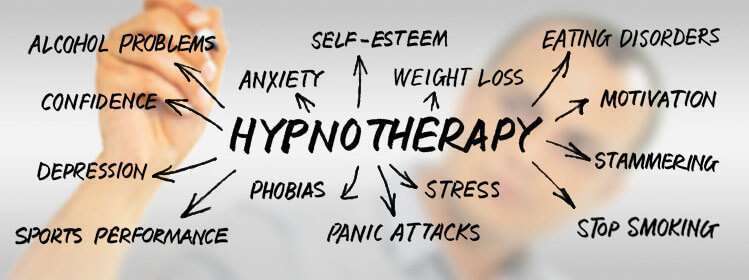Uses
There are many different reasons why a person might want to try hypnotherapy. Research suggests that some possible applications include:4
- Chronic pain conditions
- Dementia symptoms
- Nausea and vomiting related to chemotherapy
- Pain during childbirth, dental procedures, or surgery
- Skin conditions, such as psoriasis and warts
- Symptoms of irritable bowel syndrome (IBS)
- Symptoms of attention-deficit hyperactivity disorder (ADHD)
Hypnotherapy may also be used by licensed physicians and psychologists in the treatment of conditions including anxiety disorders, depression, eating disorders, and post-traumatic stress disorder (PTSD).5
Hypnotherapy may also be helpful for changing or reducing problematic behaviors. Because of this, it is sometimes used to help people quit smoking, lose weight, and sleep better.
Finding a Therapist
Your mental health practitioner may be licensed to perform hypnotherapy. If not, they may know of someone trusted who can perform hypnotherapy for you. If this is not the case, however, there are several ways to find a reputable hypnotherapist.
Word of mouth is always a great way to find any practitioner. If you know someone who has undergone this type of therapy, ask about their experiences. Keep in mind, however, that some hypnotherapists only focus on particular issues, so a friend’s therapist may not be right for you.
Although the practice tends to be controversial, many experts believe that hypnotherapy works in some cases. Discuss this treatment option with your healthcare provider. Also be sure to check with your insurance company before proceeding, as not all insurers will pay for what has sometimes been deemed an experimental treatment.
Search online for a hypnotherapist in the United States, Great Britain, or parts of Europe in the National Board for Certified Clinical Hypnotherapists database. This organization is responsible for the certification of hypnotherapists and is careful to keep the database up to date.
Common Misconceptions
Hypnotherapy is still considered controversial, as many mental health professionals dispute its effectiveness and people are sometimes afraid to try it. There are a number of myths and misconceptions about hypnotherapy that can affect how people view this therapeutic tool.
- Hypnotherapy is often confused with stage hypnosis. Stage hypnotists are performers who are excellent at reading people. They seek extraverts who will put on a great show for the crowd. Whether or not their subjects are truly hypnotized is debatable, but they are willing to go along with the sometimes outrageous suggestions of the stage hypnotist.
- Hypnotherapy doesn’t cause you to forget what happened. You will remember the things that occur during your hypnotic state, you will not be asleep or unconscious, and you will be able to break the hypnotic trance at any time.
- Hypnotherapy doesn’t cause you to lose control. During hypnotherapy, you remain in control. It is not possible for anyone to force you to do anything against your will, even under hypnosis. You will be tuned into the work at hand, and so may not pay attention to your surroundings, but you will always be in charge of your own actions, behaviors, and statements.
- Being hypnotizable doesn’t mean you are less intelligent. While some people believe that they cannot be hypnotized, research suggests that most people are hypnotizable to a certain degree. Only about 10% of people are difficult or impossible to hypnotize.6
Potential Pitfalls
While hypnotherapy is generally safe and well-tolerated, that does not mean that it doesn’t pose some potential risks.
- Hypnotherapy can produce false or distorted memories in some cases.
- People who are very suggestible may experience a decreased sense of personal control while under hypnosis.
- Some people can experience side effects such as anxiety, headaches, or dizziness.
- Hypnotherapy may not be appropriate for people who are experiencing symptoms of psychosis such as hallucinations and delusio










